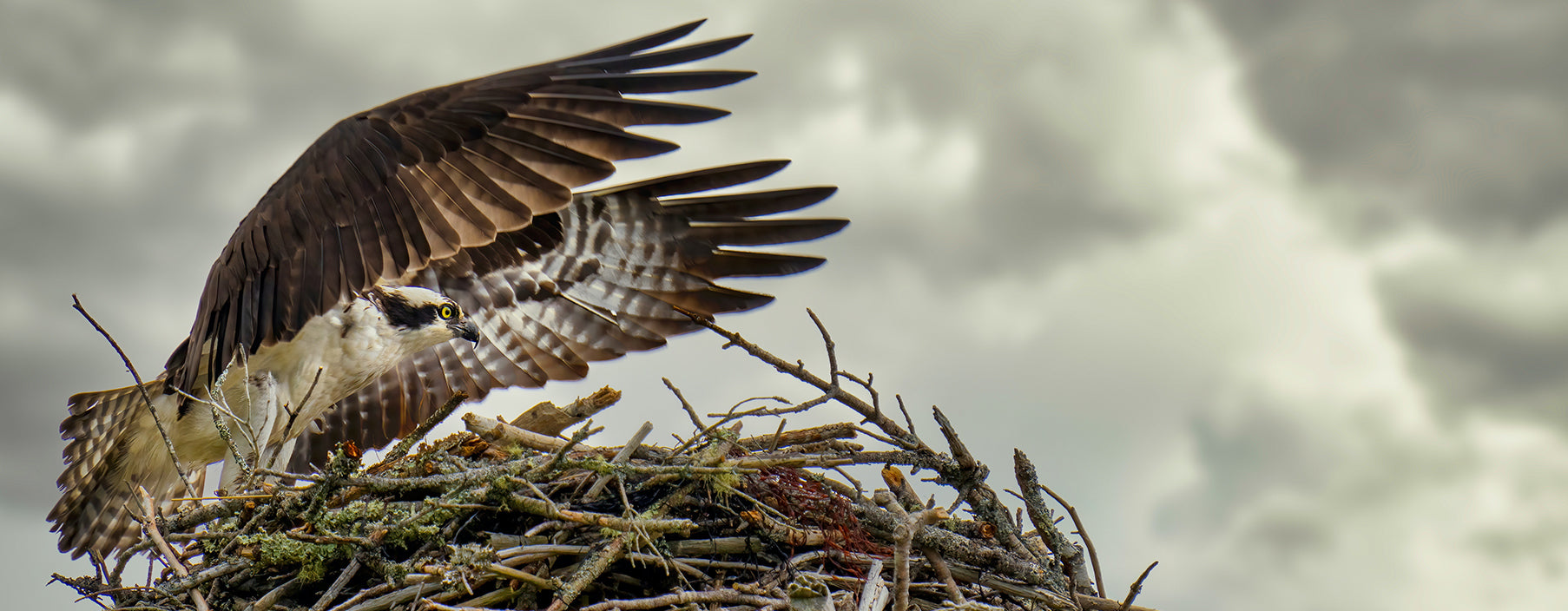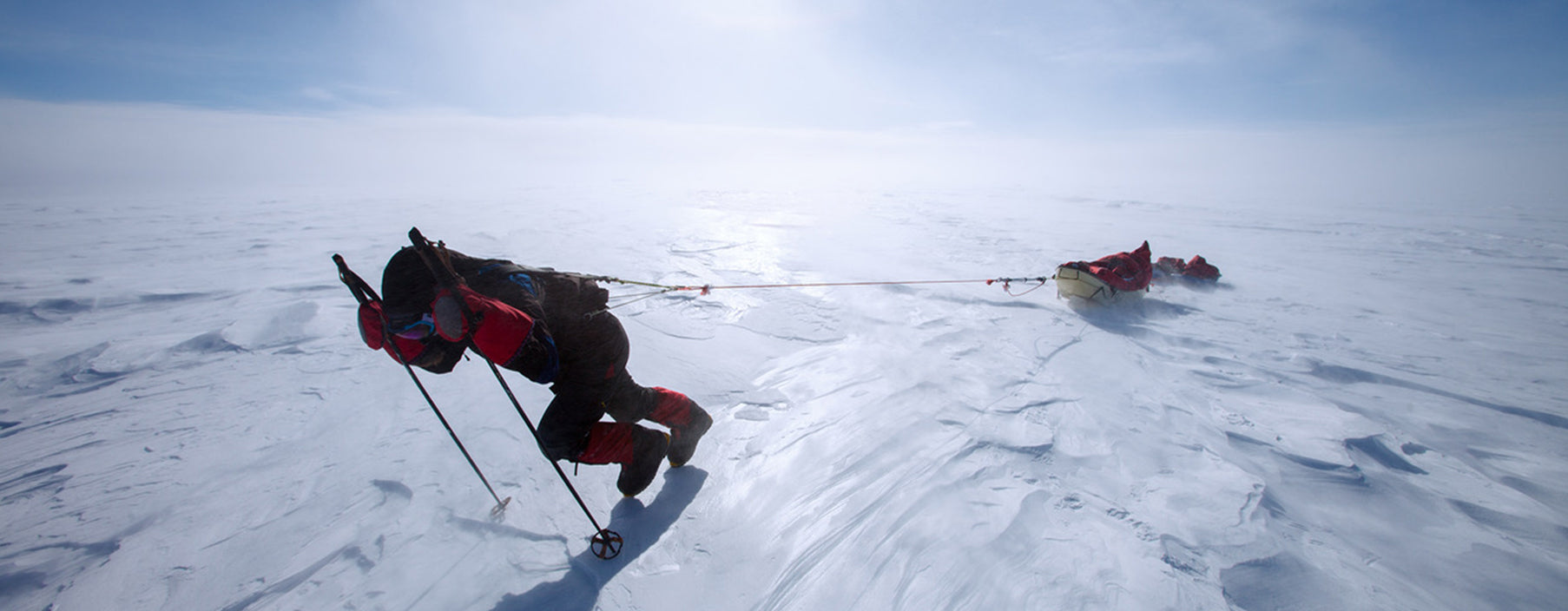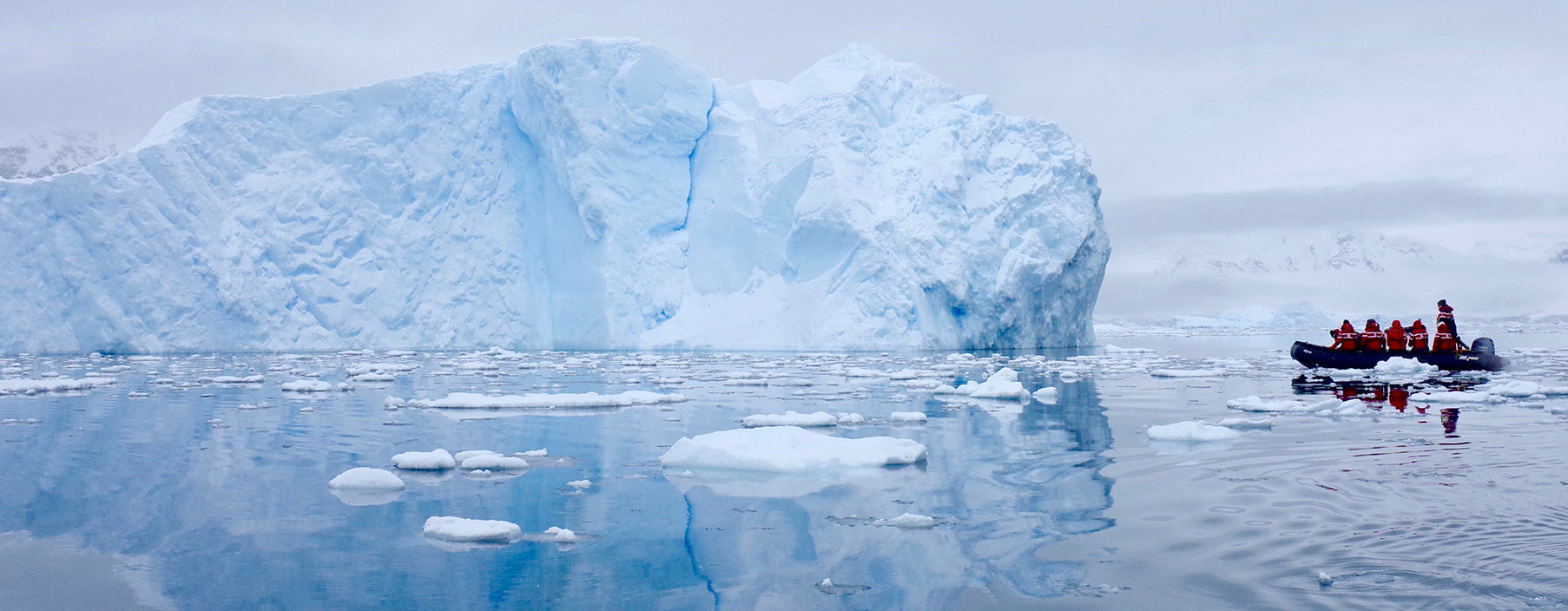
SHACKLETON MEDAL // MEET SACHA DENCH
Adventurer and conservationist Sacha Dench – whose Flight of the Osprey project has just been broadcast on Radio 4 – made her name as the Human Swan when she flew from Arctic Russia to the UK with a paramotor. As a first-time judge of the Shackleton Medal for the Protection of the Polar Regions, she talks to Rachel Halliburton about her early work as a diver, the epiphany of learning to fly solo, and what she thinks it takes if you really want to combat climate change.

“I realised that as a paramotorist I was facing many of the same challenges that the swans face.” Sacha Dench is describing the breakthrough moment that would lead to her making headlines around the world. “Like high winds on take-off,” she continues, “or potential collisions with power lines, or constantly looking for safe places to land and rest. So there were many ways to get inside the heads of migrating birds and how they might respond to a shifting landscape. I also realised I could see the kind of threats they faced from the air, threats like pollution or development encroaching on wetland sites.”
Bewick’s swans only breed in two regions of Arctic Russia: the Nenets Autonomous Okrug and Arkhangelsk Oblast. During their annual migratory flight between Russia and the UK around a third of them are hit by hunters’ bullets. While not all of them die as a result, it’s just one of the serious problems facing this beautiful bird as it travels in search of food and nesting locations. In 2016 Sacha Dench decided she herself would take to the skies in her paramotor and follow the swans’ migratory route, talking to people living everywhere from remote hunting communities to military bases on the way.
FLYING FROM THE ARCTIC TO THE UK
“The scientists were initially asking me for something quite simple,” she tells me from the remote cottage in Scotland where she is working on her book about the experience. “They wanted me to talk to the different communities of people that were possibly having an impact. The hunters, the farming communities, the fish farmers, those involved in energy generation and power companies? How do you get all of them to the table at the same time to try and look at how we can tackle all the threats?”
Getting a charismatic, fearless conservationist to descend on them from the sky was probably not one of the first answers that came up, but in 2016, that was precisely what happened. “Wherever I landed with a paramotor,” Dench explains, “it didn’t matter who was around; as soon as I took my helmet off, people would run to me and ask three key questions. ‘Where do you come from? Isn't it dangerous? And do you need help?’ I realised those were the critical three questions we needed people to be asking about helping us to conserve swans. One of the most important things from my perspective was for us to open our minds and to acknowledge that people that are often seen as the bad guys – like hunters – are actually the ones who can be the heroes of our story. So instead of saying ‘we know you’re part of the problem,’ we’d be saying ‘A lot of birds have shot in their tissue, can you help us figure out how that happened? And even more importantly, do you have any ideas about how we can stop that?’”
SWIMMING WITH SHARKS

Dench, who’s now a UN Ambassador for Migratory Species has always been as much of an adventurer as a conservationist. When she was growing up in Australia she was a champion free diver, and realised, to her initial shock, that her thirst for adventure would prove even more powerful than scientific research for drawing attention to the causes that she championed. “I'd grown up as a kid swimming in different beaches along the North Sydney coast,” she says, “and I knew there were shark nets out there. Like many others, I had assumed that the shark nets were a barrier between the swimming beach and the ocean so that sharks couldn't get to the beach into the swimmers. Then, after I had lived overseas, I decided to swim out to a shark net to see what it involved and discovered to my horror that all sorts of things were caught there, not one of which was dangerous.”
It was only when I became Australia freediving champion that everybody wanted to know what I had to say about shark nets

Yet at that point, very few people wanted to engage with her story. She continues, “With the help of a couple of NGOs I managed to get thick wads of data which showed the vast numbers of animals being killed. But the media weren’t nearly as interested as I thought they would be. Then I started to film what I found, and people were a bit more interested. Yet it was only when I became Australia freediving champion that everybody wanted to know what I had to say about shark nets. My instant reaction as a scientist was to be horrified, but then I thought, if that’s what it took to make the message palatable to people, then why shouldn’t I just run with it?”

WILD AIR
It was, in part, a bad flight in a small plane in the Caribbean that made her shift her focus from the ocean to the air. “I was on an expedition with an anthropologist visiting communities in South America who'd received international funding for an environmental development program,” she recalls. “At one point we were visiting the San Blas Islands – there are about 365 of them, and only a couple of them have landing strips which are generally longer than the island. We found ourselves confronted with a large storm and our young pilot thought he could outrun it. So we spent about 14 minutes being thrown around in this tiny plane, in a thunderstorm being sucked up, thrown around – there was lightning inside the cloud, the whole lot was terrifying.”
She suggested to the pilot that they turn round and go back to where they’d come from, but he replied that there wasn’t enough fuel. “He kept trying to dive down out of the clouds,” she says, “but the cloud level was so low that whenever we emerged we were skimming the tops of trees with no landing strip in sight. So the choice was either we located the landing strip or we ditched into the sea. I’m still here, so obviously we found the landing strip. But when we got out of the plane, he just lay on the ground with his arms and legs spread wide.”
Dench had flown all her life, but suddenly realised that even on routine flights in Europe, she was now terrified of turbulence. So she decided, as a scientist, that she was going to combat her fear by learning everything about air. “I tried various different aircraft, but they were all too complicated. I’m also a bit of a control freak. While a paraglider looks really flimsy and fragile and potentially unsafe, you can check every single line and every single bit of fabric yourself. The mechanism of flight is very simple and you can monitor it at every moment. Once I’d established that I saw somebody flying a paramotor, and realised that in a paramotor, you could fly in early in the mornings, and late in the evenings when the weather was calm – something you can’t do with a paraglider. Having a motor on your back opens up a lot more possibilities. So I started doing aerial photography for conservation, then I started to look into the decline of the Bewick’s swan.”
FLIGHT OF THE OSPREY
The success of her extraordinary flight led her to co-founding Conservation Without Borders in 2019. Among other schemes, she immediately started planning a new project to track the migratory route of the osprey. This was due to take place in 2020 but was postponed due to Covid. She completed the outward journey from Scotland to West Africa in the last part of 2022. However a serious accident in 2021 – in which her paramotor collided with the paramotor of her cameraman Dan Burton led to his death and her own, life-changing, injuries. One result of this was that Flight of the Osprey – which she is carrying out in his memory – was conducted in land vehicles including a converted army ambulance.
“Dan had a unique set of skills that I'll never again have in another flying buddy,” she declares. “He could fly paramotors even in challenging conditions. He also didn't mind landing in remote communities with people whose language he didn’t speak. We first met through the world of free diving. Over the years, he'd been more and more convinced of the importance of conservation and I know he was excited about the Flight of the Osprey project. So I hope to carry on doing him proud, to continue that legacy.”

IMPACT OF CLIMATE CHANGE ON MIGRATION
Her expeditions have shown how migration, like so much else, is being significantly impacted by climate change. “The impact of the drought across Europe was pretty shocking,” she says. “Not least because of the vast fires in France and Spain. As well as being a risk to the resident populations of ospreys, which have been reintroduced to both those countries, fire causes a barrier to flight. Ospreys are really strong fliers, but though they will fly through cloud and fog and rain, they can't fly through smoke. From what we saw that could block migration completely for many species.”

Dench’s advice to those who want, like her, to combat climate change is “to figure out what makes you powerful. I remember a moment on the flight of the swans expedition when I was travelling over a really remote area and about to land in a community that I knew nothing about. I didn't know how they'd respond to me at all. But I was using key skills of mine. I'd learned basic Russian. I grew up in the Australian outback so I was pretty confident trying to survive in the middle of nowhere if I had to. And I really loved meeting strangers. The thing is, I'm awful at parties where I have to do lots of small talk and meet a lot of people. But I love meeting unusual people and I was really passionate about doing something for the Bewick’s swans. So basically find that area, find a project where you can combine what you're good at with what you're passionate about. And that's probably the best thing you can do.”
HEAR MORE FROM SACHA
If you would like to hear more from Sacha you can listen to her interview with Rachel Halliburton on the Drink the Wild Air podcast HERE.
SHACKLETON MEDAL
Find out more about the 2023 Shackleton Medal for the Protection of the Polar Regions, the judging panel and the previous winner, Dr Heidi Sevestre HERE.
Nominate either yourself or the person that you believe should win the 2023 Shackleton Medal for the Protection of the Polar Regions HERE.


